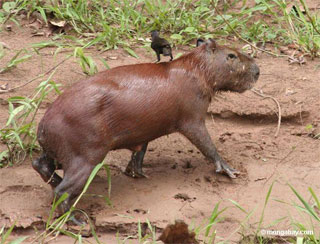Brazil may ban new sugar cane cultivation in the Pantanal
Brazil may ban new sugar cane cultivation in the Pantanal
mongabay.com
August 6, 2008
|
|
Brazil would restrict sugar cane cultivation in the world’s largest tropical wetland under a proposed plan to protect the Pantanal, reports Reuters.
The proposal would ban new ethanol plants in the wetland area and require farmers already operating in the are to use no-till planting methods. Farmers would also be required to eliminate the use of machinery and agrochemicals.
Reuters reports that Brazilian Agriculture Minister Reinhold Stephanes and Environment Minister Carlos Minc met on Monday to announce support for the proposal, the fate of which lies in the hands of President Luiz Inacio Lula da Silva.
“Since it preserves the Amazon and the Pantanal, clearly defining where it can be planted in the latter region, and without cutting existing production, it seems to me that the agreement is good for everyone,” Minc said in a statement.

The capybara, earth’s largest rodent, is common in the Pantanal |
The Pantanal, an area of flooded grassland and savanna covering 200,000 square kilometers during the rainy season, includes parts of Brazil, Paraguay, and Bolivia and is fed by the Rio Paraguay. The wetland is home to some 3500 species of plant and 650 species of birds. About 125 types of mammals, 180 kinds of reptiles, 41 types of amphibians, and 325 species of fish have been found in the region. The Pantanal in an important source of freshwater to neighboring farming areas and downstream urban areas. Deforestation has destroyed 17 percent of the Pantanal, according to Conservation International.
Brazil has some 1.988 million sq km of forest land suitable for sugar cane cultivation of which 30 million hectares is classified as “useable” by the government.
The government estimates that it take about 7 million hectares to double Brazil’s current ethanol output of around 20 billion liters per year.
Brazilian ethanol is widely recognized as the most efficiently mass-produced biofuel on the market, yielding 5.5 times as much energy per unit of input compared with U.S. corn ethanol. Nearly eight out of every ten new cars sold in Brazil are flex-fuel—capable of running on either an ethanol-gasoline mix (“gasohol”) or bioethanol.